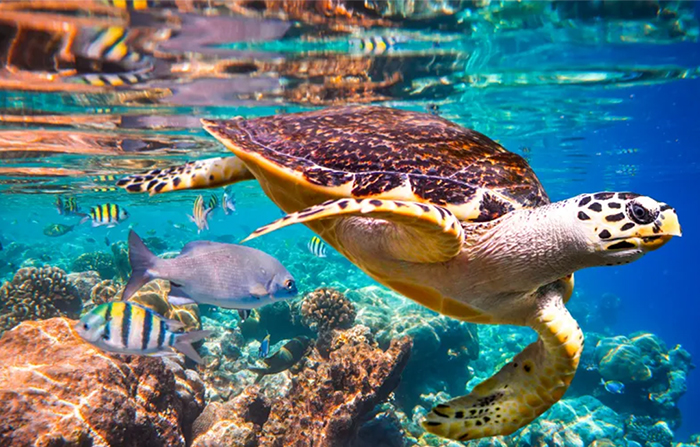Greetings from BSG Chairperson Mr. Vishesh Gupta
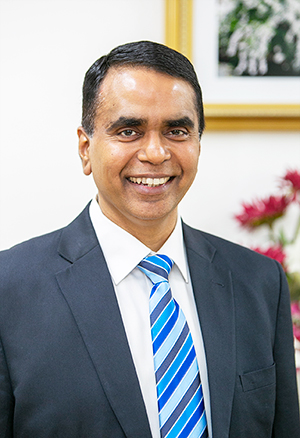
Dear Members of Bharat Soka Gakkai and All Readers,
I hope all of you and your family members are doing well amidst the rising Covid-19 cases. Along with the coronavirus pandemic and the war, we are also witnessing an increasingly warm summer season this time across India. The need to take proactive action to mitigate the effects of climate change is becoming more and more apparent with each passing day.
It is for this reason that the fifth issue of the ‘BSG for SDG’ ‘SUSTAINABLE’ newsletter focuses on the theme: “We Are Nature”. This theme commemorates the ‘International Mother Earth Day’ which is celebrated on April 22, the ‘International Day for Biological Diversity’ which is celebrated on May 22, and the ‘World Environment Day’, which is celebrated on June 5 every year.
According to a recent report by the United Nations, nature is deteriorating at unprecedented rates in human history; around 1 million animal and plant species face the threat of extinction, many within decades. This can have grave impacts on the very bedrock of human civilisation – be it our economies, food security or health.
The slogan for ‘International Day for Biological Diversity’ this year is “Building a shared future for all life”. All life is interconnected. There is no doubt that no life can survive without nature. As SGI President Daisaku Ikeda states: “human beings are just one of the living species on Earth and, as such, an integral part of the eternal life cycle that has created and sustained our natural environment. That cycle… is a series of interlocking chains of life; if one is broken, all the others are affected, and if one part of the whole is poisoned, the entirety is contaminated.” (The New Human Revolution, A novel by Daisaku Ikeda, Volume 15, ‘Revitalization’ chapter, pg. 24) It can therefore be safely concluded that biodiversity is indeed the foundation upon which we can resolve several sustainable development challenges.
In the same vein, the theme of the 2022 World Environment Day is “Only One Earth”. It highlights the urgency of taking action for nature – for it is only by living in harmony with nature can human beings continue to thrive. As SGI President Daisaku Ikeda says, “We are dependent on the Earth, not the other way around.”
Through this fifth issue of the ‘BSG for SDG’ ‘SUSTAINABLE’ newsletter, it is my sincere hope that all the readers are able to make a fresh determination in their own life to preserve and protect our Mother Earth.
As we explore the contents of this issue,
- Let’s learn about the richness of life that Planet Earth is home to, the threats all life forms including human beings ourselves currently face as a direct result of human activity, and the impact this can have on the accomplishment of the Sustainable Development Goals.
- Let’s reflect on how we can restore our relationship with the natural world by basing our actions on the awareness that we are ourselves a part of nature.
- Let’s empower ourselves, and our family and friends to take action, for it is not too late to make a difference if we start now.
I look forward to hearing your views and takeaways from this issue.
Warm regards
Vishesh Gupta
BSG Chairperson
When we think of nature, we often think of wildlife and this can seem disconnected from our daily existence. However, nature provides innumerable benefits to humanity, such as climate regulation, fresh water and biodiversity – in fact our well-being depends entirely on nature. Without plants there would be no oxygen, and without bees to pollinate there would be no fruits or nuts. Coral reefs and mangroves provide coastal areas immense protection from cyclones and tsunamis. Many medicines are harvested from nature, including new medicines such as fungi growing on the fur of sloths that can fight cancer. There are countless such complex interactions between humans and nature, and within nature, through millions of years of evolution. These interactions when in balance contribute towards a healthy planet. Such services provided by ecosystems are estimated to be worth trillions of dollars – double the world’s GDP!
Furthermore, nearly a third of SDG targets depend on nature to be achieved. For instance, improving the sustainability of fisheries under SDG 14: Life Below Water can help reduce hunger (SDG 2), improve the resilience of the poor (SDG 1), and contribute to responsible production and consumption (SDG 12). To learn more about how nature connects to the SDGs: Click here
However, nature is being rapidly degraded by irresponsible human activities – from the rich rainforests to coral reefs. The number of animals living on the planet has plunged by half since 1970. A recent report found that more than 75% of the Earth’s terrestrial areas are substantially degraded. This can have potentially alarming consequences for all SDGs. The report indicates that such current trends will hamper progress towards 80% of reviewed SDG targets connected to poverty, hunger, health, water, cities, climate, oceans, and land.
In fact, some scientists believe that a sixth mass extinction event has already begun. While life on planet Earth has suffered five mass extinctions of biodiversity in its long history, caused by massive volcanic eruptions, deep ice ages, meteorite impacts and clashing continents, this one is very different, because it is caused by a single species – us.
The cutting down of forests for development to meet the needs of a growing population – whether in the form of more agricultural land, industrial sites or housing – is one of the major contributors for loss of wildlife. Just in 2016, the area of Britain and Ireland was lost to deforestation. Poaching and unsustainable hunting of animals for food is pushing more than 300 mammal species towards extinction (The Guardian). Industrial pollution and plastic pollution is killing marine life. The root cause of the COVID-19 pandemic can also be linked to our altering relationship with nature. To help prevent further outbreaks of zoonotic viruses like COVID-19, the illegal wildlife trade and the destruction of habitats has to stop – we need to rebuild by working with nature. (See: A Message from Nature: Coronavirus)
There has never been a more urgent need to halt the damage we are causing to nature – for our survival depends on nature.
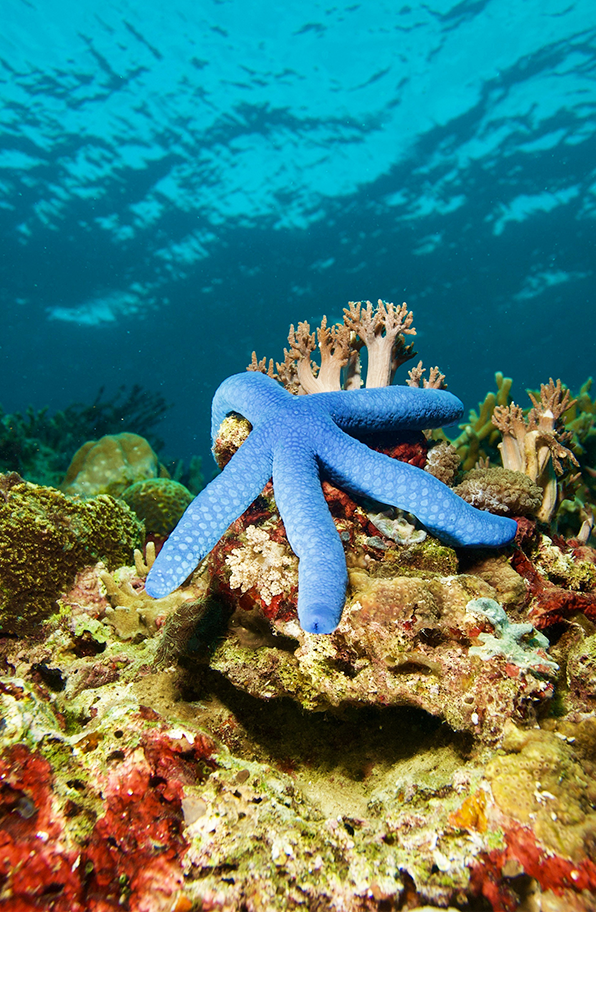
Biodiversity
Biodiversity – a contraction of “biological diversity” was a term coined in 1985 and refers to the variety of all life on Earth and all its interactions. It comprises several levels of organisation, starting with genes, then individual species, then communities of creatures and finally entire ecosystems, such as forests or coral reefs, where life interacts with the physical environment. These varied and complex interactions have made Earth habitable for billions of years. We can understand more about biodiversity through the following three levels:
- Genetic diversity: the different genes contained in all the living species, including individual plants, animals, fungi, and microorganisms.
- Species diversity: the different species, as well as the differences within and between different species.
- Ecosystem diversity: the different habitats, biological communities and ecological processes, as well as variation within individual ecosystems.
Some facts!
- About 1.7 million species of animals, plants and fungi have been recorded, but there are likely to be 8-9 million and possibly up to 100 million!
- A spoonful of soil contains 10,000 to 50,000 different types of bacteria!
- The tropics are the most biodiverse – for instance there are 700 species of trees in just 37 acres of Borneo’s forest, which is the same number of tree species found in the whole of North America!
- Recent studies also indicate that creatures thought to be single species may actually be dozens. Further, if we add bacteria and viruses, the total number of distinct creatures may actually be in billions!
- India is a mega biodiverse country – home to around 8% of the world’s biodiversity on just 2.3% of global land area, and contains sections of four of the 36 global biodiversity hotspots.
Source: The Guardian and India Mongabay
 To Read
To Read
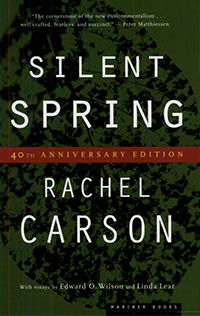
‘Silent Spring’ by Rachel Carson
The book written by Rachel Carson, an American marine biologist and conservationist, was published in 1962, and became an iconic publication that drew attention globally to the damaging effect humans are creating on the natural world. The book delves into the genesis and rise of synthetic pesticides such as Dichlorodiphenyltrichloroethane (DDT), the environmental damage caused by their usage, and the powerful nexus of the chemical companies to manipulate scientific evidence to swing public opinion in their favour. The book sparked widespread public concern over the dangers of improper pesticide use and the need for better pesticide controls, and an environmental movement that led to the creation of an Environmental Protection Agency in the United States, and eventually a ban on the use of DDT in the United States in 1972 based on its adverse environmental effects, such as those to wildlife, as well as its potential human health risks.
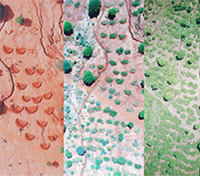
UN Decade on Ecosystem Restoration: 2021-2030
Ecosystems support all life on Earth – the healthier our ecosystems are, the healthier the planet – and its people. The UN Decade on Ecosystem Restoration (2021-2030) aims to “prevent, halt and reverse the degradation of ecosystems on every continent and in every ocean.” However, it will only succeed if everyone plays a part – for example by planting trees, cleaning up river banks, or giving nature space to recover. Learn more about the UN Decade of Ecosystem Restoration.
 To See
To See

Sir David Attenborough: A Life on Our Planet
In this documentary, Sir David Attenborough – who has recently been named a Champion of the Earth by the UN Environment Programme – reflects on the evolutionary history of life on Earth, the damage caused to wild places by humans, and shares his vision for the future based on working with nature rather than against it.
Watch trailerWatch film
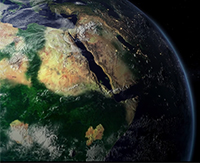
Athletes Urge Countries to Join Race to Restoration
In this UN Decade of Ecosystem Restoration (2021-2030), countries have promised to restore 1 billion hectares of degraded ecosystems – an area larger than China. In a short video, world class athletes call upon the countries to re-imagine a different future based on protecting and restoring nature by starting to act on their promises.
Watch Video
 To Listen
To Listen
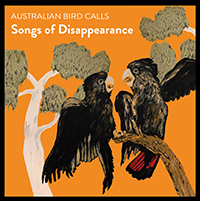
Songs of Disappearance
Created by BirdLife Australia, the album “Songs of Disappearance” features the tweets and squawks of 53 of Australia’s most threatened species. Bird recordings used in the album have been collected by David Stewart, a wildlife sound recordist who has spent more than 30 years collecting often rarely heard sounds of Australia’s wildlife. When the album launched in December 2021, it made it to the top five of Australia’s Aria music sales chart even surpassing the likes of Abba, and Christmas favourites like Michael Bublé and Mariah Carey!
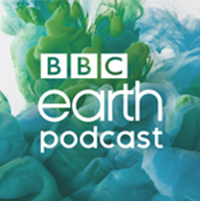
BBC Earth Podcast Series
Fascinating podcast series to learn about the diverse ecosystems and life forms of planet Earth, including at the most unexpected of places! Learning about the natural world can make us learn so much about ourselves!
 To Play
To Play
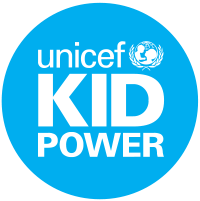
Nature Activities for Kids
UNICEF lists 6 fun and simple nature activities for young children to develop an appreciation and connection with the natural world.
Explore here
Human beings and the natural environment are inseparable, rather, they are one and the same. As SGI President Daisaku Ikeda explains: “All phenomena in the universe exist within the context of mutually supportive relationships, what Buddhism refers to as ‘dependent origination.’ In this view, nothing exists without meaning and nothing is wasted. Interweaving these ‘threads’ of interdependence, the universe has brought forth and nurtured life, including human life, on this planet.”
He adds in another writing: “The doctrine of causal [or dependent] origination amounts to an ethos of symbiosis – an ethos that ought to be shared by all peoples. In an address delivered to the Chinese Academy of Social Sciences, I defined the ethos of symbiosis as ‘a psychological tendency to favour harmony over oppression, unity over division, “we” over “I”; a belief that human beings should live together harmoniously with each other and with nature, support each other and flourish together.’ Only when it is seen by all to be such an ethos will the doctrine of causal origination have the power to serve effectively as a basis for global solidarity.” (From ‘Choose Peace: A Dialogue Between Johan Galtung and Daisaku Ikeda’)
However, the prevalent view of human-nature relationship regards humans as separate from and superior to nature, and that the natural world is disposable to human needs. Such a view justifies reckless consumption and exploitation of the natural world, leading to unprecedented environmental degradation.
In a lecture delivered at the Rajiv Gandhi Institute for Contemporary Studies, New Delhi, on October 21, 1997, President Ikeda offers two dominant thoughts that lie at the root of environmental pollution – “the optimistic conviction in the power of nature to retain its balance no matter how severely it is damaged; and that humankind, as the ‘lord of creation’, has the right to dominate and control all existence.” For centuries, these two ideologies have defined our modern conception of humanism, and have only served to deepen dualism and conflict between human beings and nature. In our pursuit to tame and control nature, we have forgotten to coexist with nature respectfully.
He explains that the “blessings of nature, which human beings have always regarded as limitless, were in fact the finite cargo of this “spaceship” that is Earth. Lacking this perspective”, he adds that the human society has been basing itself on “egoistic humanism” and continuing to consume the Earth’s resources at a rate that far exceeds nature’s capacity for self-reproduction, harming and polluting the environment and destroying the organic systems that comprise the natural world. (The New Human Revolution, A novel by Daisaku Ikeda, Volume 15, ‘Revitalization’ Chapter, pg. 25)
We need to rethink our current relationship with nature, as that would define our future. As a way out, he puts forth the notion of ‘cosmic humanism’, one that regards the life of the individual human as extending out to and embracing the entire cosmos, to break through the present impasse. Such a view, breaks down the perceived sense of duality, that humans and nature are separate, and engenders an all-embracing, inclusive worldview which sees humans as an inherent part of nature, not superior but equal to all other beings.
President Ikeda asserts in his 2012 Environment Proposal that sustainability must be seen as more than adjusting existing policies to draw a balance between economic and ecological imperatives. Sustainability should be considered “within the context and experiences of daily life since this is where we must sense the full weight of life’s inalienable dignity, and reflect on what is truly important to us and what we must come together to protect… At its heart, sustainability is the work of constructing a society that accords highest priority to the dignity of life–the dignity of all members of present and future generations and the biosphere that sustains us.”
Since human activity has led to the destruction of nature, it is humans ourselves who must revive and restore nature. President Ikeda says, “No matter how complex global challenges may seem, we must remember that it is we ourselves who have given rise to them. It is therefore impossible that they are beyond our power as human beings to resolve. Refocusing on humanity, reforming and opening up the inner capacities of our lives–this kind of individual human revolution can enable effective reform and empowerment on a global scale.” Let’s reflect on the transformation each one of us can create by adopting a sustainable lifestyle that is based on the awareness of interconnectedness with nature – that we are, in fact, nature itself.
Empowering Others to Preserve Nature through EducationMedha Bhatt | Women’s Division | Vadodara
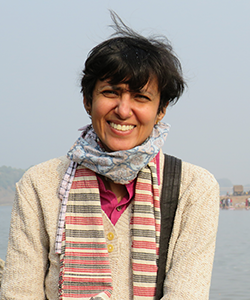
20 years ago, “sustainability” was not a buzzword and was restricted to the vocabulary of environmentalists. As a fresh textile graduate with the focus of getting a job in the area of sustainability, I was introduced to the Soka Gakkai by a friend in 2004, which empowered me to take charge of my life and contribute to building a sustainable world through my individual efforts.
I joined as a Training Coordinator in the first ever Zero Waste Project established in India in a tourist village in Kerala. The Zero Waste philosophy aimed at boosting the local economy, generating livelihoods and converting local resources into environment friendly products. I began training a small group of young underprivileged women. The training focused on converting textile waste into works of textile art that brought high financial returns and uplift the lives of these women. The training transformed their lives economically and made the women courageous in sharing and expressing their personal stories of exploitation due to tourism.
From around 2012, I began creating awareness in urban citizens about impacts of pollution on our ecosystems by illustrating bird species, trees and insects through textile waste. I began participating in peoples’ movements to conserve trees in Trivandrum city and awarded a hand stitched textile badge to each citizen who stood in solidarity to save a tree. Keeping the words of SGI President Daisaku Ikeda in my heart, who says, “The understanding and cooperation of others is critical in everything we do. The key is not to count on their help but face the challenge firmly on our own, thus winning their respect and support” (The New Human Revolution, A novel by Daisaku Ikeda, Volume 23, ‘Light of Learning’ chapter, pg. 147), I kept moving ahead with focus and determination.
However, my neighbourhood was not adapting to sustainable lifestyles and my studio was mounting with waste. I realised that inculcating values of loving nature could sow seeds of sustainability in the younger generation. I started the Bug Club in 2013, with a Nature library for the neighbourhood children. Gradually, I received support from journalists who published articles in the newspapers, environmentalists donated books on nature, and friends opened their gardens and hearts for me and the children to conduct workshops and discover the beauty of trees, plants, birds, seeds, fruits, insects and our interdependence on them. Today, these children are in their youth and I feel proud to see their Instagram posts sharing their appreciation and respect for nature and their strong beliefs in conserving their environment.
Since 2015, I have tried to incorporate the SDGs through teaching assignments, lectures and talks in various design institutions. In 2018, I guided five design students as part of their two weeks course, in reducing waste by nearly 40% by altering the consumption practices of nearly 1000 students living on campus. I was featured as the Green Warrior by Freedom Tree, Mumbai and was invited as the Green Hero in 2020 by the Global Shapers India Chapter to motivate the youth towards climate action and sustainability.
Today, we seem to spend our lives making more money and buying more things that feed, but never satisfy. The solution to this exploitative economics is that we need to be raised on gratitude. We need to speak to the natural world and raise a pledge of interdependence with respect towards all of life – the winds, the waters, the natural world. Gratitude is the powerful foundation of sustainability.
Towards 2030, I am determined to create an environment of having greater gratitude and respect for our environment and develop a spirit of constant learning amongst the people on preserving and protecting nature.
A Transformative Youth Working for Biodiversity ConservationBodhisatwa Chaudhuri | Young Men’s Division | Kolkata

I’m currently a Teaching Fellow at Ashoka University. In the past I have worked on research projects in the field of wildlife biology. Ever since I was a child, I have observed the effects of the changing environment around me. As I ventured into my academia and entered into the work field, I gained greater knowledge and understanding about the importance of biodiversity conservation for climate action. Not wanting to be a mere spectator, and empowered by the writings of SGI President Daisaku Ikeda, I decided to take action to combat climate change and become a transformative youth.
When BSG launched the ‘BSG for SDG’ initiative in 2021, I felt further encouraged to contribute to the achievement of the Sustainable Development Goals (SDGs) in my own unique way. Inspired by this initiative, I have chosen to focus on SDG 13 (Climate Action). As I have learned from the Soka Gakkai – that the place to take action is right here and the time to take action is right now, so I have started off from where I am – my neighbourhood and my community.
The city of Kolkata is particularly vulnerable to the effects of climate change such as sea level rise and extreme weather events. Patuli township, the place where I live, is situated in the southern fringes of Kolkata and lies along the Tolly Nullah, which was once a major distributary of the Hooghly river, the Adi Ganga. The area was developed in the late 1980s, before which it was a wetland ecosystem. Over the years, despite rapid pace of urbanisation, Patuli has held on to its ecological roots and the area hosts a large number of water bodies as well as open fields, green areas, parks and avenue trees that serve as important habitats for a large number of fauna including birds, reptiles, mammals, fish, amphibians and many types of invertebrates.
The presence of biodiversity is an indicator of the health of an ecosystem and wetlands are important ecosystems for a number of reasons. Wetlands act as sponges and store excess rainwater, filter wastewater, recycle nutrients, and can potentially provide food and livelihoods in the form of local fisheries, and ecotourism. Due to their ability to soak up excess water, wetlands are particularly important for mitigating the effects of climate change arising out of severe weather events such as floods and storms.
Each year, during the winter months (from mid-November to mid-March), Patuli hosts a roost of about 2500 wetland birds. In addition to the wetland birds that visit the area each winter, Patuli is also home to many other resident bird species as well and is listed as a bird biodiversity hot-spot in eBird. Biodiversity conservation is one of the best ways to mitigate the effects of climate change because biodiversity and the biogeochemical cycles (such as the water cycle, carbon cycle and nitrogen cycle) exist in a state of dynamic equilibrium and influence one another. The natural world acts as a self-sustaining system where climatic stability maintains ecosystems and ecosystems regulate the climate.
For the BSG for SDG campaign, I envision contributing to the transformation of Patuli into a sustainable township in the future. I started off by first documenting the biodiversity of the area, taking bird counts and identifying trees. Recently, I have started discussing the importance of biodiversity conservation with the local citizens of the area and getting them acquainted with the many species of birds that are found in the area. I am planning to organise birdwatching sessions in the future and hold discussions about the many steps that we as citizens can take to ensure that the natural heritage of the area is protected. I have also been involved in tree plantation drives.
I am determined to work in the near future with the citizens and concerned authorities to preserve the wintering roost and other green areas and waterbodies in Patuli for generations to come.
 SDG Tip for Daily Life
SDG Tip for Daily Life
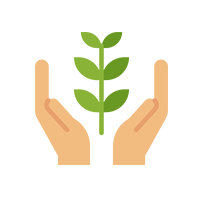
How Can We All Help Nature?
Our wellbeing is not possible without the wellbeing of nature. When we help nature, we actually help ourselves. Let’s learn some practical ideas on how to 1) reduce our ecological footprint, 2) conserve nature, and 3) connect with nature. Let’s put such actions into practice and also share them with our family and friends!
Click here to learn more
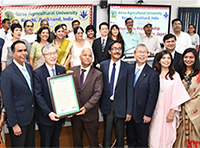
Updates
1. Birsa Agricultural University confers Honorary Professorship on SGI President Daisaku Ikeda
Birsa Agricultural University (BAU), Ranchi, Jharkhand conferred an honorary professorship on SGI President Daisaku Ikeda on 22nd April 2022 in recognition of his outstanding contribution in the field of green revolution, global peace and new global humanism. This is the 399th academic honour conferred on President Ikeda; and the 19th from India. The citation was received by Mr. Yoshihisa Baba, former president of Soka University; Mr. Vishesh Gupta, Bharat Soka Gakkai (BSG) chairperson, and Dr. Akash Ouchi, BSG Honorary Deputy Chairperson, on behalf of President Ikeda. In March 2022, BAU and Soka University signed an agreement for mutual cooperation in the field of teaching, research, publication and other academic activities.

2. Change Maker Humanity Award
Recognizing individuals who provided selfless and untiring support to society especially during the COVID-19 Pandemic, Jaipur National University (JNU) in association with Bharat Soka Gakkai (BSG) announced the winners of the ‘Change Maker Humanity Award’ at a ceremony held in Jaipur on Saturday, 26th March 2022.
This joint initiative was launched on December 15th, 2021, to honour and celebrate the humanitarian contributions of those who have worked tirelessly in the areas of Education, Medical & Community Healthcare and Social Services in the state of Rajasthan. The ‘Change Maker Humanity Award’ received a very positive response and various Individuals, teams, and institutes in Rajasthan were nominated for this award.
An eminent Jury selected 29 awardees in 16 categories from the nominations that were received. The awardees were felicitated by the Chief Guest, Dr. Mahesh Joshi, (Minister of Public Health Engineering & Ground Water for Rajasthan) and the Guest of Honour, Shri Ashok Chandna, (Minister of Skill, Employment & Entrepreneurship (DSEE), and Youth Affairs & Sports for Rajasthan).
Read the full media report here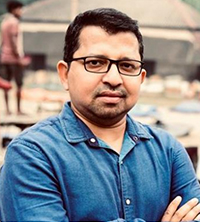
3. Sujay Santra’s message at the BSG for SDG meeting – SDG 3 health and well being for all
Mr Sujay Santra, Founder and CEO of Ikure Techsoft, and an Ashoka Fellow since 2015 shared his experience of bringing maternal healthcare facilities for people living in the remotest corners of India, at the 9th BSG for SDG meeting held on 11 April, 2022. He talked about various aspects of developing good health and wellbeing (SDG 3) in one’s daily life, and how we can support others to lead a healthy life through one’s actions.
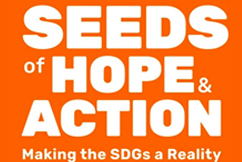
4. Seeds of Hope and Action Exhibition
The Seeds of Hope and Action (SOHA) exhibition is a joint initiative of the Soka Gakkai International (SGI) and the Earth Charter International. It introduces a positive vision for sustainable living that can contribute to the realisation of the Sustainable Development Goals (SDGs). Owing to the COVID-19 pandemic, this exhibition has been organised virtually by BSG in various institutes of India since 2021.
The most recent additions to the list of institutes where SOHA has been conducted by BSG include: Lady Irwin College, Delhi University (30th March 2022),Government Rehabilitation Institute for Intellectual Disabilities (GRIID), Chandigarh (21st March), DAV College, Chandigarh (2nd April 2022), and Amity University, Noida (7th April 2022), Aayojan School of Architecture, Jaipur (23rd April), and Hill Spring International School, Mumbai (25th April) .
Contact Us
Any queries or suggestions regarding the newsletter can be addressed to sdg@bharatsokagakkai.org
To know more about the ‘BSG for SDG’ initiative, visit the: BSG website/






